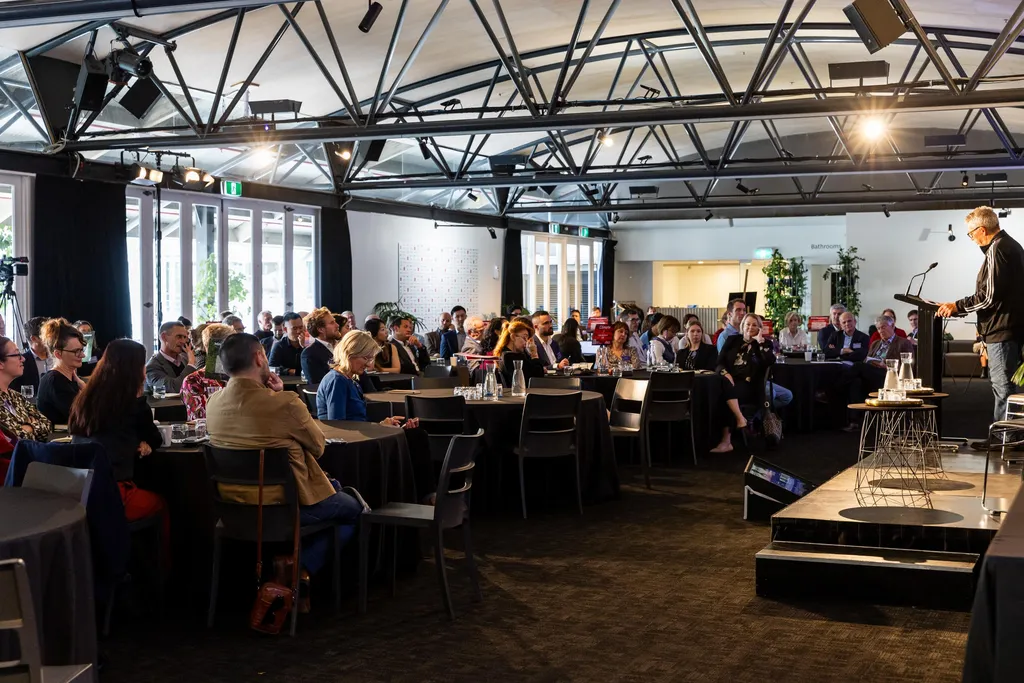Learn
Mindful Money Conference Wrap Up 2025
26th June 2025
Mindful Money's fifth annual conference explored investment strategies for climate transition, nature regeneration, and positive impact. Industry leaders discussed how mindful investment can accelerate New Zealand's sustainable future
Investing for the Transition Conference
Barry Coates opened Mindful Money’s fifth annual conference with a speech celebrating the charity’s seven years of empowering ethical investment. He highlighted how Mindful Money has reached half a million users, increased transparency and reduced levels in harmful investments. The next stage development will increase the visibility of companies delivering positive impact.
Rob Campbell, Chancellor of AUT, one of New Zealand’s most respected business directors and a champion of sustainability and diversity gave the keynote address. He called for a decisive shift to a regenerative economy that aligns investment with ecological and social responsibility. He emphasised that true transformation depends on values rather than ownership structures, highlighting the importance of “intent, incentive and inclusion.” Campbell encouraged investors to think holistically: “The seeds, the early shoots of the transition are present and need our support as we unwind the unsustainable systems we live in now.” His message underscored that ‘mindful investment’ is not idealistic; rather it is a rational, necessary step for securing a sustainable future.
Panel One: Unlocking Investment in the Climate Transition
Lachlan Nixon at Motion Capital led a discussion exploring actionable investment strategies to accelerate the climate transition. Panel Experts Deion Campbell (Operating Partner at Morrison Global), Jo Kelly (CE of Centre for Sustainable Finance), Mike Casey (CEO Rewiring Aotearoa) provided key insights:
- Transition Finance Matters: Investments supporting high-emitting sectors to move toward net zero are critical. Transition finance complements green finance and requires measures such as science- based targets and credible 1.5 degree pathways to avoid greenwashing.
- KiwiSaver’s Untapped Potential: Institutional investors can allocate more KiwiSaver funds to private assets (KiwiSaver has around 3% in private assets, whereas Australian Super has more like 15%-20%), including climate investments. While perceived barriers exist (such as regulatory clarity on liquidity management), there are no actual legislative restrictions on investment in private assets.
- Policy Shifts Are Needed: A robust and cohesive energy strategy is essential. Public-private collaboration, clear long-term policy direction, and financial instruments like partial crown-backed guarantees could drive investment.
- Electrification and Decarbonization: It’s likely NZ will need to double the supply of electricity to replace expensive fossil fuels (around 73% of total energy use) with affordable renewable electricity. Scaling distributed energy and household electrification could unlock billions in savings. By financing solar panels, batteries, and electrification technologies directly through power bills, gentailers could aggregate small customers into a broader investment opportunity.
The discussion underscored the need for certainty, innovation, and smarter capital deployment to realise New Zealand’s climate ambitions.
Participants during the Roundtable Discussions called for education about the opportunities and financing mechanisms to support structuring of projects with finance and build grassroots pressure for supportive policies and regulation. KiwiSaver mandates could specifically require transition investment and into NZ innovations or companies that deliver impact and returns. Some felt we may also need to bring investors from offshore who can leverage the market intelligence held by NZ investors.
Panel Two: Shifting Investment from Harming Nature to Regeneration
Panellists Dr. Kayla Kingdon-Bebb (CEO of WWF New Zealand), Andrew Grant (CEO of Next Foundation), Natalie Whitaker (Founder of Toha Network), facilitated by Kate Vennell co-CEO of Mindful Money, highlighted urgent risks around ecosystems collapse. By contrast, there are exciting opportunities for economic growth if we recognise nature on capital balance sheets and secure finance for regeneration.
- Economic Dependency on Nature: WWF NZ’s recent report, A nature positive Aotearoa (Oct 24), highlighted the dependency and particular vulnerability of primary industries, such as tourism and fisheries. However, reversing nature loss could add $270 billion to NZ’s economy over the next 50 years.
- Emerging Nature Finance Markets: Fiordland should be compared to the Amazon in its ability to sequester carbon. Predator control will improve its climate mitigation capacity. Markets for carbon and biodiversity credits have potential to be a source of funding for major projects. Global players like Microsoft and Amazon are already investing in large nature-based carbon removal projects.
- Recognizing Small-Scale Conservation Efforts: Aotearoa benefits from very high rates of conservation volunteering and extensive grassroots environmental stewardship. Building a strong data infrastructure will ensure links between the actor, the land, and the outcomes are maintained so downstream financial benefits will effectively incentivise regeneration.
Participants during the Roundtable Discussions called for more reporting and disclosure by corporates on nature-related risk and value of ecosystem services. Some were excited that the voluntary biodiversity trading system newly in place in Australia could be a guide for Aotearoa. Others noted the value of holistic long-term views - recognising our health and wellbeing depends on nature. We must incorporate ecological and indigenous worldviews and use stories to advocate for nature.
Mindful Money Work Programme
Mindful Money will continue to work with others to strengthen the role of investment in the key strands of work from the conference:
- On the climate transition, including through the release of the annual survey on Investor action.
- On nature regeneration, through a major new report on ocean-friendly investment, and a public outreach campaign.
- On positive impact investing, through new portfolio information on the Mindful Money website and public outreach to build demand.

All conference photos are available to be downloaded here
Sponsors

Mindful Money thanks the following sponsors for their generous support for the conference:
Major Sponsor: Morningstar Sustainalytics
Silver Sponsors: NZ Super Fund & Stewart Investors
Bronze Sponsors: Trust Investments, Generate, Craigs Investment Partners & Betashares
Community Partners: Foundation North & Whakatupu Aotearoa Foundation

